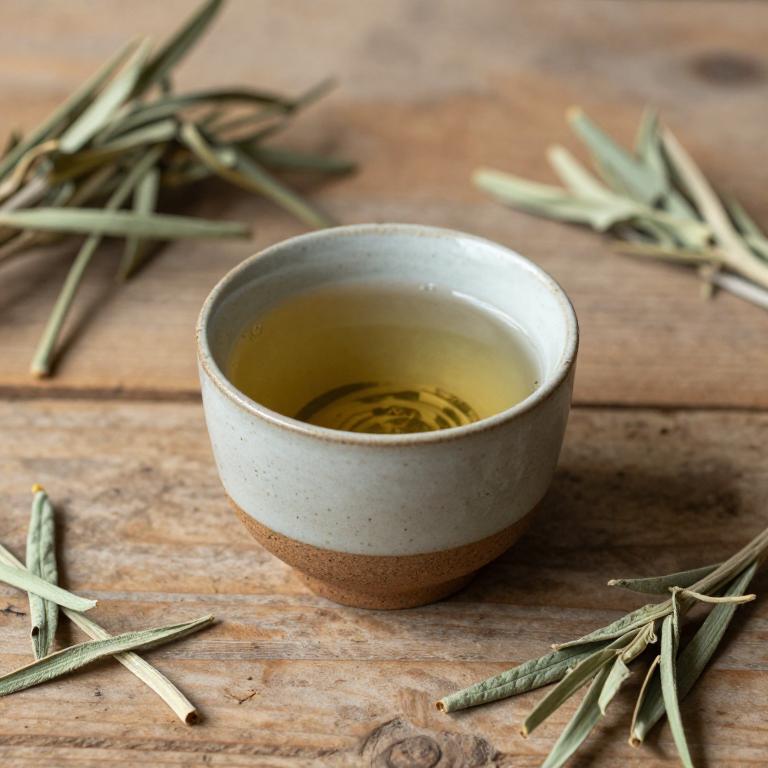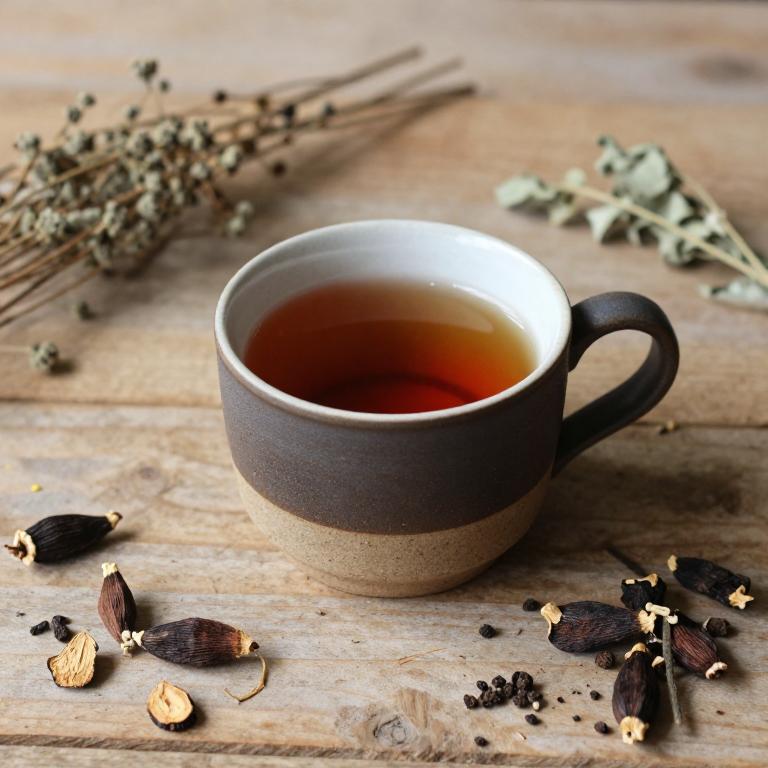10 Best Herbal Teas For Cramps

Herbal teas are a natural and effective remedy for relieving cramps, particularly those related to menstrual discomfort, digestive issues, or muscle tension.
Commonly used herbs such as ginger, chamomile, peppermint, and cramp bark are known for their soothing and anti-inflammatory properties. These teas work by relaxing smooth muscles, reducing inflammation, and promoting digestion, which can ease cramping symptoms. Drinking a warm cup of herbal tea can also provide a calming effect, helping to reduce stress, which often exacerbates cramps.
For best results, it is advisable to consume these teas regularly, especially during periods or when experiencing frequent cramping.
Table of Contents
- 1. Stinging nettle (Urtica dioica)
- 2. Chaste tree (Vitex agnus-castus)
- 3. Fennel (Foeniculum vulgare)
- 4. Ginger (Zingiber officinale)
- 5. Cumin (Cuminum cyminum)
- 6. Chamomile (Matricaria chamomilla)
- 7. Turmeric (Curcuma longa)
- 8. Dog rose (Rosa canina)
- 9. Lemon grass (Cymbopogon citratus)
- 10. Black pepper (Piper nigrum)
1. Stinging nettle (Urtica dioica)

Urtica dioica, commonly known as stinging nettle, is a versatile herb that has been traditionally used to alleviate menstrual cramps due to its high concentration of anti-inflammatory compounds and minerals.
When prepared as a herbal tea, stinging nettle can help reduce uterine spasms and ease the discomfort associated with dysmenorrhea. The tea is typically made by steeping dried leaves in hot water, and it is often consumed during the days leading up to menstruation or during the menstrual cycle. Its rich content of iron, magnesium, and silica may also support overall reproductive health and reduce bloating.
While generally safe, it is advisable to consult a healthcare provider before using stinging nettle tea, especially for pregnant women or those with existing health conditions.
2. Chaste tree (Vitex agnus-castus)

Vitex agnus-castus, commonly known as chasteberry, is a popular herbal remedy used to alleviate menstrual cramps and regulate menstrual cycles.
This herb is believed to support hormonal balance by influencing the pituitary gland, which can help reduce the severity of cramps and other menstrual discomforts. Chasteberry tea is often recommended for women experiencing premenstrual syndrome (PMS) symptoms, including bloating, mood swings, and pain. When consumed regularly, it may help ease cramping by reducing prostaglandin levels, which are responsible for uterine contractions.
However, it is important to consult with a healthcare provider before using chasteberry, especially if you have a history of hormonal disorders or are pregnant.
3. Fennel (Foeniculum vulgare)

Foeniculum vulgare, commonly known as fennel, is a versatile herb often used in herbal teas to alleviate menstrual cramps and digestive discomfort.
Its seeds contain compounds like anethole, which have mild antispasmodic properties that can help relax uterine muscles and ease cramping. Fennel tea is traditionally prepared by steeping dried seeds in hot water, and it is often consumed during or before menstruation to provide natural relief. The tea is also known for its warming properties, which can help soothe the digestive system and reduce bloating.
While generally safe, it is advisable to consult a healthcare provider before using fennel tea, especially during pregnancy or if taking other medications.
4. Ginger (Zingiber officinale)

Zingiber officinale, commonly known as ginger, is widely used in herbal teas to alleviate menstrual cramps due to its natural anti-inflammatory and analgesic properties.
The active compounds in ginger, such as gingerol and shogaol, help reduce uterine contractions and ease pain associated with cramps. Drinking ginger tea can also improve digestion and reduce nausea, which often accompanies menstrual discomfort. To prepare the tea, fresh or dried ginger root is boiled in water and allowed to steep for several minutes.
Regular consumption of ginger herbal tea is considered a safe and effective natural remedy for managing cramps without the side effects of pharmaceutical medications.
5. Cumin (Cuminum cyminum)

Cuminum cyminum, commonly known as cumin, is often used in herbal teas to help alleviate menstrual cramps due to its warming properties and ability to promote digestion.
The essential oils in cumin, such as cuminaldehyde, have been shown to have antispasmodic effects that may reduce uterine contractions and ease discomfort. To prepare a cumin tea, simply steep a teaspoon of whole or ground cumin seeds in hot water for several minutes. This tea can be consumed warm, either on its own or combined with other herbs like ginger or cinnamon for enhanced benefits.
While generally safe, it is advisable to consult a healthcare provider before using cumin tea, especially during pregnancy or for individuals with certain health conditions.
6. Chamomile (Matricaria chamomilla)

Matricaria chamomilla, commonly known as chamomile, is a popular herbal tea used to relieve menstrual cramps due to its calming and anti-inflammatory properties.
The tea contains compounds like apigenin, which may help relax smooth muscle tissue and reduce pain. Chamomile tea is often consumed warm, either on its own or with a touch of honey, to enhance its soothing effects. It is generally considered safe for most adults, though pregnant women should consult a healthcare provider before use.
Regular consumption of chamomile tea may offer mild relief from cramps and promote overall digestive comfort.
7. Turmeric (Curcuma longa)

Curcuma longa, commonly known as turmeric, is a popular herbal remedy used in teas to alleviate menstrual cramps and other types of abdominal discomfort.
The active compound in turmeric, curcumin, possesses strong anti-inflammatory and analgesic properties that help reduce pain and inflammation associated with cramps. When brewed into a tea, turmeric can be easily absorbed by the body, offering a natural and soothing alternative to over-the-counter pain medications. Many people find that drinking turmeric tea regularly can help ease menstrual symptoms and improve overall digestive health.
However, it is advisable to consult a healthcare provider before using turmeric tea, especially if you have underlying health conditions or are taking other medications.
8. Dog rose (Rosa canina)

Rosa canina, also known as rosehip, is a popular herbal remedy used in teas to alleviate menstrual cramps and other types of abdominal discomfort.
The tea is rich in antioxidants, vitamins, and anti-inflammatory compounds that help reduce pain and inflammation in the body. It is often recommended for women experiencing dysmenorrhea, as it can ease the intensity of cramps during menstruation. The mild, slightly tart flavor of rosehip tea makes it a pleasant and soothing option for regular consumption.
Regular intake of rosa canina herbal tea may also support overall digestive health and immune function, making it a versatile and beneficial natural remedy.
9. Lemon grass (Cymbopogon citratus)

Cymbopogon citratus, commonly known as lemon grass, is a popular herbal tea used to alleviate menstrual cramps due to its soothing and anti-inflammatory properties.
This aromatic herb contains compounds like citral and myrcene, which have been shown to help reduce uterine contractions and ease pain. Lemon grass tea is often consumed warm, either on its own or combined with other calming herbs like ginger or chamomile for enhanced relief. Its mild, citrusy flavor makes it a pleasant and accessible option for those seeking natural remedies for cramps.
Regular consumption of lemon grass tea may also support overall digestive health and reduce menstrual discomfort.
10. Black pepper (Piper nigrum)

Piper nigrum, commonly known as black pepper, is often used in herbal teas to help alleviate menstrual cramps due to its warming properties and potential anti-inflammatory effects.
The essential oils and compounds found in black pepper may help improve blood circulation and reduce uterine spasms, providing natural relief from discomfort. While not a substitute for medical advice, some individuals find that drinking black pepper tea can ease cramping when consumed in moderation. It is typically combined with other herbs like ginger or cinnamon to enhance its therapeutic benefits.
However, it is important to consult a healthcare professional before using black pepper tea, especially for those with sensitive stomachs or existing medical conditions.